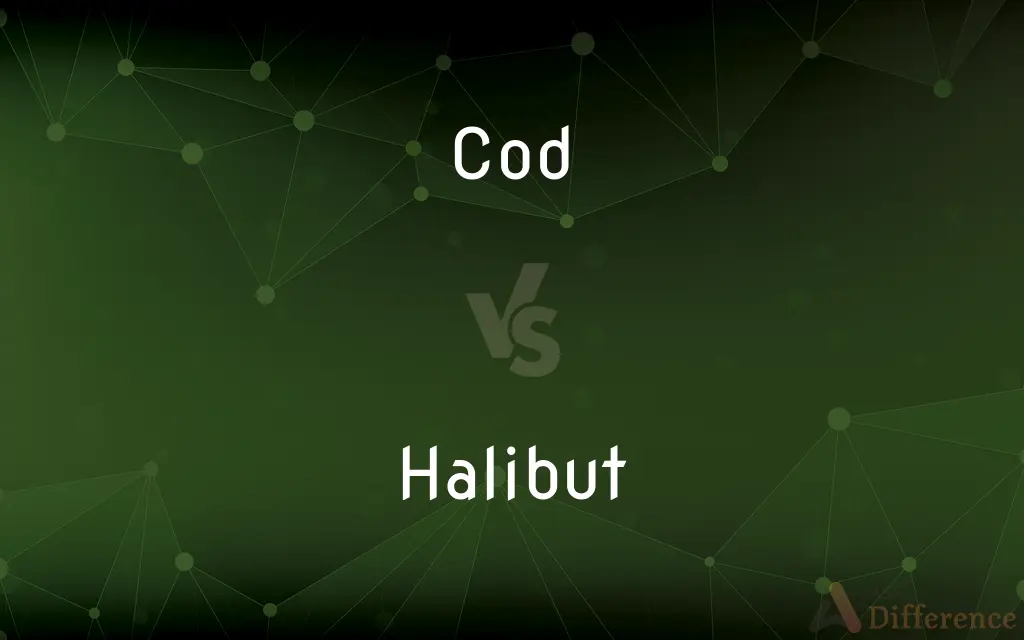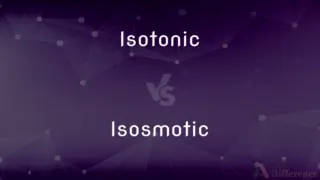Cod vs. Halibut — What's the Difference?
Edited by Tayyaba Rehman — By Fiza Rafique — Updated on October 27, 2023
"Cod" refers to a cold-water fish with mild-flavored, white flesh; "Halibut" is a large, flat, diamond-shaped fish known for its sweet-tasting white meat.

Difference Between Cod and Halibut
Table of Contents
ADVERTISEMENT
Key Differences
Cod is a popular fish that thrives in cold, deep waters, especially in the North Atlantic. On the contrary, Halibut is a flatfish primarily found in the cold waters of the North Pacific and North Atlantic.
The flesh of the Cod is white, mild in flavor, and tends to flake when cooked, making it a favorite in many dishes. Conversely, the Halibut has a white, sweet-tasting meat that's denser and holds up well to various cooking methods.
In terms of appearance, Cod has a more traditional fish shape with a barbel on its chin. In contrast, Halibut is large, flat, and diamond-shaped, with both eyes on one side of its body.
The Cod fishery has been significant for centuries, especially in areas like Newfoundland. In contrast, Halibut fishing has been an important industry in places such as Alaska.
Historically, Cod has played a crucial role in trade, notably dried as "salt cod." Halibut, on the other hand, has been a prized catch for its large size and delicious meat.
ADVERTISEMENT
Comparison Chart
Habitat
Cold waters, especially North Atlantic.
North Pacific and North Atlantic cold waters.
Flesh Taste & Texture
Mild flavor, flaky when cooked.
Sweet-tasting, dense.
Appearance
Traditional fish shape with chin barbel.
Large, flat, diamond-shaped with eyes on one side.
Economic Significance
Significant fishery for centuries.
Prized for its size and meat quality.
Grammatical Role
Noun.
Noun.
Compare with Definitions
Cod
A cold-water fish known for its white, flaky meat.
Cod is a staple in traditional New England fish and chips.
Halibut
A large, flatfish with sweet-tasting white meat.
Grilled halibut is a summer favorite in coastal towns.
Cod
A species prevalent in the North Atlantic.
The decline of Cod populations affected many fishing communities.
Halibut
Native to the cold waters of the North Pacific and North Atlantic.
Alaskan halibut is especially sought after for its quality.
Cod
A fish with a barbel on its chin.
The barbel helps Cod find food on the seafloor.
Halibut
Known for its diamond shape with eyes on one side.
The unique appearance of the halibut is a topic of interest at aquariums.
Cod
A significant fish in global trade and culinary dishes.
Cod has been overfished due to its high demand.
Halibut
Prized in commercial fishing due to its size.
A single halibut can weigh over 500 pounds.
Cod
Cod is the common name for the demersal fish genus Gadus, belonging to the family Gadidae. Cod is also used as part of the common name for a number of other fish species, and one species that belongs to genus Gadus is commonly not called cod (Alaska pollock, Gadus chalcogrammus).
Halibut
Holds up well to grilling, frying, and baking.
The dense meat of the halibut makes it versatile in the kitchen.
Cod
See Atlantic cod.
Halibut
Halibut is the common name for three flatfish in the genera Hippoglossus and Reinhardtius from the family of right-eye flounders and, in some regions, and less commonly, other species of large flatfish. The word is derived from haly (holy) and butte (flat fish), for its popularity on Catholic holy days.
Cod
Any of various marine fishes of the family Gadidae, which includes the Atlantic cod and the haddock.
Halibut
Any of several large edible flatfishes of the genus Hippoglossus and related genera, of northern Atlantic or Pacific waters.
Cod
(Archaic) A husk or pod.
Halibut
A large flatfish of the genus Hippoglossus, which sometimes leaves the ocean floor and swims vertically.
Cod
(Archaic) The scrotum.
Halibut
A large, northern, marine flatfish (Hippoglossus vulgaris), of the family Pleuronectidæ. It often grows very large, weighing more than three hundred pounds. It is an important food fish.
Cod
(Obsolete) A bag.
Halibut
Lean flesh of very large flatfish of Atlantic or Pacific
Cod
(obsolete) A small bag or pouch.
Halibut
Marine food fish of the northern Atlantic or northern Pacific; the largest flatfish and one of the largest teleost fishes
Cod
A husk or integument; a pod.
Cod
The cocoon of a silkworm.
Cod
The scrotum (also in plural).
Cod
A pillow or cushion.
Cod
The Atlantic cod, Gadus morhua.
Cod
The sea fish of the genus Gadus generally, as inclusive of the Pacific cod (Gadus macrocephalus) and Greenland cod (Gadus ogac or Gadus macrocephalus ogac).
Cod
The sea fish of the family Gadidae which are sold as "cod", as haddock (Melanogrammus aeglefinus) and whiting (usually Merlangius merlangus).
Cod
Other unrelated fish which are similarly important to regional fisheries, as the hapuku and cultus cod.
Cod
Other unrelated fish which resemble the Atlantic cod, as the rock cod (Lotella rhacina) and blue cod (Parapercis colias).
Cod
A joke or an imitation.
I assume it all could just be a cod.
Cod
A stupid or foolish person.
He's making a right cod of himself.
Cod
Having the character of imitation; jocular. (now usually attributive, forming mostly compound adjectives).
“Illegitimi non carborundum” is a well-known example of cod Latin.
Dalton categorises Muse's latest composition as “cod-classical bombast”.
Cod
(Polari) Bad.
Cod
To attempt to deceive or confuse; To joke; To kid.
Cod
A husk; a pod; as, a peascod.
Cod
A small bag or pouch.
Cod
The scrotum.
Cod
A pillow or cushion.
Cod
An important edible fish (Gadus morrhua), taken in immense numbers on the northern coasts of Europe and America. It is especially abundant and large on the Grand Bank of Newfoundland. It is salted and dried in large quantities.
Cod
The vessel that contains the seeds of a plant (not the seeds themselves)
Cod
Lean white flesh of important North Atlantic food fish; usually baked or poached
Cod
Major food fish of arctic and cold-temperate waters
Cod
Fool or hoax;
The immigrant was duped because he trusted everyone
You can't fool me!
Cod
Harass with persistent criticism or carping;
The children teased the new teacher
Don't ride me so hard over my failure
His fellow workers razzed him when he wore a jacket and tie
Cod
Payment due by the recipient on delivery;
A collect call
The letter came collect
A COD parcel
Cod
Collecting the charges upon delivery;
Mail a package C.O.D.
Cod
Often dried and salted for preservation.
Salt cod is a key ingredient in many Mediterranean dishes.
Common Curiosities
Is Cod meat flaky?
Yes, Cod has a flaky texture when cooked.
What's unique about Halibut's appearance?
Halibut is a flat, diamond-shaped fish with both eyes on one side of its body.
Has Cod been a significant fish for trade?
Yes, Cod, especially dried as "salt cod," has played a crucial role in trade for centuries.
What is the primary habitat of Cod?
Cod primarily thrives in the cold waters of the North Atlantic.
How does Halibut taste?
Halibut has a sweet-tasting, dense white meat.
Is Halibut a big fish?
Yes, Halibut can be quite large, with some weighing over 500 pounds.
Is Cod overfished?
Cod has faced overfishing issues due to high demand, impacting its populations.
Are there different species of Halibut?
Yes, there are several species, with the Pacific and Atlantic halibut being the most well-known.
How can you recognize a Cod?
Cod has a more traditional fish shape and a distinctive barbel on its chin.
What dishes commonly feature Cod?
Cod is often used in fish and chips, stews, and fish cakes.
How do chefs typically prepare Halibut?
Halibut can be grilled, fried, baked, or broiled due to its dense meat.
Where is Halibut most commonly found?
Halibut is prevalent in the cold waters of the North Pacific and North Atlantic.
Share Your Discovery

Previous Comparison
Dynamized vs. Dynamised
Next Comparison
Isotonic vs. IsosmoticAuthor Spotlight
Written by
Fiza RafiqueFiza Rafique is a skilled content writer at AskDifference.com, where she meticulously refines and enhances written pieces. Drawing from her vast editorial expertise, Fiza ensures clarity, accuracy, and precision in every article. Passionate about language, she continually seeks to elevate the quality of content for readers worldwide.
Edited by
Tayyaba RehmanTayyaba Rehman is a distinguished writer, currently serving as a primary contributor to askdifference.com. As a researcher in semantics and etymology, Tayyaba's passion for the complexity of languages and their distinctions has found a perfect home on the platform. Tayyaba delves into the intricacies of language, distinguishing between commonly confused words and phrases, thereby providing clarity for readers worldwide.














































